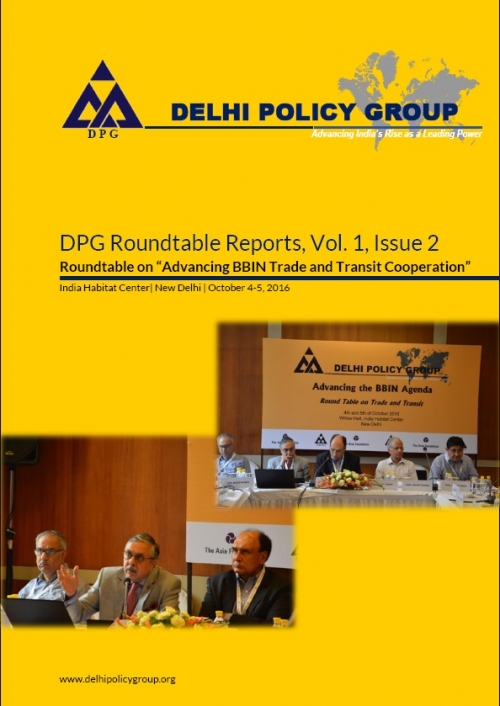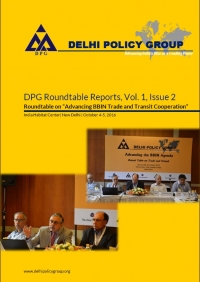Roundtable on "Advancing BBIN Trade and Transit Cooperation"
The Delhi Policy Group (DPG) in partnership with the Asia Foundation organized two roundtable discussions on “Advancing BBIN (Bangladesh-Bhutan-India-Nepal) Trade and Transit Cooperation” on October 4-5, 2016. Eight distinguished participants, one each from Nepal, Bhutan, Bangladesh and India participated and presented at each of the round-tables. The discussion on BBIN Trade and Transit addressed concerns and issues from the perspective of each of the four countries; and brought out ideas and recommendations to assuage issues and advance this cooperation.
The Roundtable on BBIN Trade opened with a keynote by Dr. A. Didar Singh, Secretary General, Federation of Indian Chambers of Commerce and Industry (FICCI). Dr. Singh highlighted that, since the impasse of the last SAARC Summit in Kathmandu the prospects for BBIN Cooperation has brightened. Recently, BBIN has received considerable political traction; and hence there is an increased focus on development of BBIN trade and economic integration. The BBIN cooperation will further people to people relationship and diminish political issues.
The BBIN trade roundtable identified the existing issues and made recommendations to address the impediments in order to forward this economic integration. Trade experts from all the four countries agreed that BBIN should facilitate trade linkages by investing on better infrastructure, addressing issues with non-tariff barriers/ non-tariff measures, creating value chains by enhancing relations within the private sector. Further analysis showed that the establishment of the BBIN economic corridor will help the landlocked countries of Bhutan and Nepal to a great extent. Additionally, it can be identified that energy trade is the future of this trade engagement and has large potential to push the overall economic growth.
The Roundtable on BBIN Transit opened with a keynote address by Ms. Sripriya Ranganathan, Joint Secretary, Bangladesh and Myanmar Division, Ministry of External Affairs. Ms. Ranganathan stated that currently India’s Foreign Policy has an increasing focus on improving relations with its neighbors. She reiterates that Government of India is committed to advance regional integration. She highlighted that BBIN Rail Agreement is currently a priority and negotiations continue. There are also efforts to develop an e-knowledge network for the BBIN Countries. Government of India is also looking at developing the North Eastern city of Guwahati into an air transportation hub to improve connectivity between India and its three eastern neighbors.
This session conducted an in-depth analysis on the prevailing state of Transit cooperation in the sub region. It is important to note, that the biggest challenges in transit are weak infrastructure, lack of regulatory harmonization, no effective interaction process between cross border businesses, and lack of efficient coordination mechanisms between land port authorities, businesses and logistical companies. In order to improve transit cooperation, it is important to improve infrastructure and also maintain similar standards in all four countries to ensure seamless connectivity. Additionally, developing soft infrastructure and creating a secured electronic data management system, where data can be fed and shared by the four countries should be a priority to ensure hassle free transit without any threat to the security of the nations.



